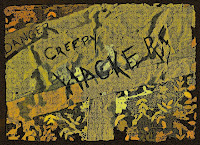A few weeks ago my partner decided to start his own business. Like most people he is starting out with limited funds so he decided to create his website via one of those places that offers free sites complete with hosting, shopping cart, etc. for online stores. He boasted that he could see his visitors’ IP addresses and even the types of computer systems they had. I remember saying something like, “if you can see them, then someone can see you” which, of course, did not translate into “guy speak” and was therefore dismissed.
This morning his Webroot Internet Security software sent him an alert regarding malware; someone had broken through the firewall, changed his security filter to “allow,” and received free access to all his files. What’s really scary is that he can’t reset his own system; he performed a “system restore” to an earlier time but it did not help—the hacker has apparently appointed a sentinel (probably a Trojan virus). My partner’s only option is to wipe his drive and reinstall his entire system. A hassle? Yes! But even worse—what files did the hacker peruse or download if any? Banking information? The password vault? Nightmarish!
Therefore, I thought it might be helpful for all of us to review/share some safety tips:
Know Your Magical Words
Your computer, your router, and just about everything has a password—use them. I heard that most people never change the default passwords in their systems. If you’ve left your password at “Admin”—change it today!
While we’re on the topic of passwords, please don’t use the same password for everything. You can bet that once the hacker learns a magic word it will be the first word he tries at the next locked door.
Proceed with Caution
We all do it—we’re cruising along on the Internet and come across a detour on some website, a game or some other fun temptation--Do Not Enter! If it is really so interesting then open another window and run a search for the company or program. Make sure the site or download is virus free and find out what personal data is collected and how that information is used. Remember, everyone is handing out cookies and they might be more “trick” than “treat.”
Never Stand Alone
Don’t leave your Internet at idle for long periods of time, this allows time for hackers to be mischievous. If you are going to be away from the computer for any length of time shut down your system, disconnect your internet, or run a program such as a virus scan.
Be Able to Defend Yourself
I highly recommend having multiple firewalls and multiple anti spyware/virus software systems—what one system doesn’t catch the next one probably will. On my PC I have Webroot Internet Security Complete, ThreatFire, and Ad-Aware. (Ad-Aware and ThreatFire have free versions available for download.) There are many anti-virus and anti-spyware packages available though so find one that suits your needs and is compatible with your system.
Plan “B”
Always have a current back-up of your entire system just-in-case. I back-up to an exter
Blog: BookEnds, LLC - A Literary Agency (Login to Add to MyJacketFlap)
JacketFlap tags: Writer beware, Add a tag
It's been a long, long time since I've written a post on writers beware in publishing. I think that after a certain amount of time I've made the incorrect assumption that my readers know this already. I forget that daily I'm reaching new people and that some of those who were here in the early days have moved on to other things.
Not too long ago I received an email from an author with an offer. She had a contract in hand from Tate Publishing and was seeking representation. Of course she was really excited. Tate was offering to publish her book for free and, for an additional $4,000, would supply a publicist. Ouch.
It took me two seconds to google "Tate Publishing Preditors and Editors" and find that this publisher was not recommended. I immediately notified the author, told her she should never pay to get published, and sent the link. She replied that payment was for the publicist only and optional. I'm doubtful, but I don't know for sure.
And then I read some of the manuscript. And my heart hurt. This manuscript was nowhere near ready for publication. It needed a lot of work, and I'm not saying the author won't get there someday, because let's face it, we've all written something that should never have been shown to a beta reader, let alone been published, but it's not ready now. And I worried. Will this author sign this contract simply because it's there, because all other avenues have been exhausted and because she figures it's time?
I don't know what the final outcome was. I never heard back from the author. What I do know is that there are those out there in all areas of our lives, preying on those who are desperate for a good word, positive feedback, and success.
If you've never been to Preditors and Editors or Writer Beware or the Writer Beware blog, please go now. Even if you think you know how to spot a someone trying to take advantage of you go. It's up to all of us to protect the writing community and each other, and the more information we arm ourselves with the more we can help others.
I hope this author shredded that contract and went back to honing her writing skills. I really do hope that.
Jessica
Blog: Writing and Illustrating (Login to Add to MyJacketFlap)
JacketFlap tags: Author, News, Young Adult Novel, Publishing Industry, Boycott, Dorchester Publishing, Writer beware, Brian Keene, Leisure Books, Add a tag
Briefs: Dorchester Woes Continue; The Brand of Mary Higgins Clark; And More
 Dorchester Publishing continues to do its best zombie impression, as a number of authors have learned the ailing company continues to sell digital copies of their work even after they no longer hold the rights, and despite repeated assurances they would stop this practice. Horror writer Brian Keene detailed the situation on his blog, saying that he found unauthorized e-copies of his books under the Dorchester banner selling through various digital outlets. “In the most recent case (iBooks), Dorchester blamed their vendor, Libre Digital, but provided no documentation verifying this. An employee at Apple cast doubt on this explanation. In the case of Kindle, they blamed Amazon.com. Again, an employee at Amazon cast doubt on this.” Keene says he has not been compensated by Dorchester since mid-2009, with author authors owed money from even earlier. More than 100 authors are calling for a boycott of Dorchester.
Dorchester Publishing continues to do its best zombie impression, as a number of authors have learned the ailing company continues to sell digital copies of their work even after they no longer hold the rights, and despite repeated assurances they would stop this practice. Horror writer Brian Keene detailed the situation on his blog, saying that he found unauthorized e-copies of his books under the Dorchester banner selling through various digital outlets. “In the most recent case (iBooks), Dorchester blamed their vendor, Libre Digital, but provided no documentation verifying this. An employee at Apple cast doubt on this explanation. In the case of Kindle, they blamed Amazon.com. Again, an employee at Amazon cast doubt on this.” Keene says he has not been compensated by Dorchester since mid-2009, with author authors owed money from even earlier. More than 100 authors are calling for a boycott of Dorchester.
Keene also provided notes from a conference call to creditors last August that showed how dire Dorchester’s financial situation was and presumably still remains: “The company saw a 60% decrease in book orders in mid-2009; payroll was down from 1 million to $600,000; the company had no cash flow, but also had no bank debt; the company owed six million dollars to various creditors, including $700,000 to active authors and $400,000 to inactive authors; ebooks accounted for 10% of their profit; their trade paperback plan was currently on hold; they didn’t think the sale of the company was possible; and that as of August 9th (2010), they considered themselves in bankruptcy but are not actually filing for bankruptcy’.” A spokesperson for Dorchester did not respond to requests for comment.
You can read all the sordid details on Brian’s Blog. http://www.briankeene.com/?p=6140
Not a good place to be for anyone involved.
Talk tomorrow,
Kathy
Filed under: Author, News, Publishing Industry, Young Adult Novel Tagged: Boycott, Brian Keene, Dorchester Publishing, Leisure Books, Writer beware




What happened to your partner's website is really scary especially that it is an online store. And those nasty hackers!, I wish we could get rid of them.
I've had my own share of bad experience like yours but is only on my Facebook account. I was not able to properly log out my FB account and when I logged in again, nasty pictures were posted all over my wall. I had to explain to all my friends that I did not post them. I had to delete the pictures manually and change my username and password to fix everything. From then on, I always make sure that I log out from any online account properly.
Thanks for giving us the heads up, Robyn. Happy Halloween :-)
Good post really interesting and usefull.
The danger of having multiple anti-virus packages is that they can interfere with each other.
You also want an alphanumeric password—numbers, letters, symbols, capitals, lower case, whatever you can. The more you have in there, the harder it is to hack, particularly if it's a nonsense password.